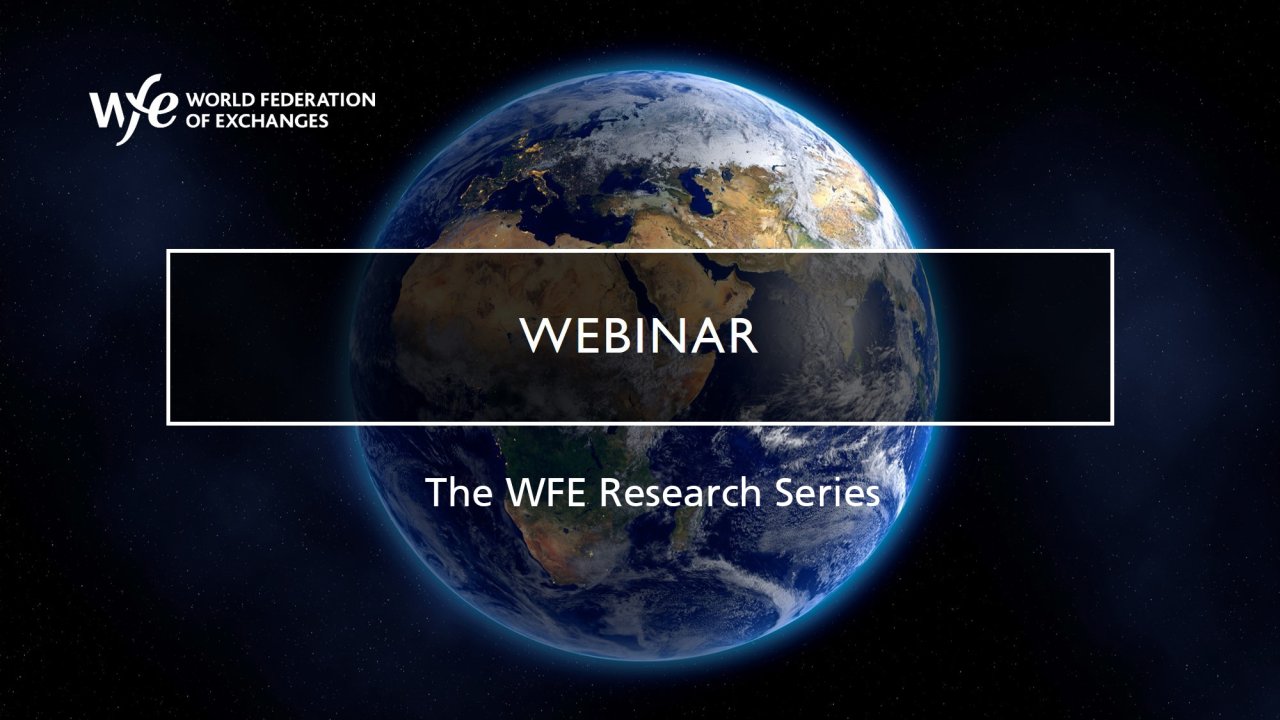WFE Webinar
On The Quality of Cryptocurrency Markets Centralized Versus Decentralized Exchanges

Introduction: Nandini Sukumar, CEO, The World Federation of Exchanges
Moderator: Pedro Gurrola-Perez, Head of Research, The World Federation of Exchanges
Presenter: Andrea Barbon, Assistant Professor of Finance, School of Finance, University of St. Gallen, Switzerland
Abstract:
Despite the growing adoption of decentralized exchanges, not much is yet known about their market quality. To shed light on this issue, we compare decentralized blockchain-based venues (DEX) to centralized crypto exchanges (CEX) by assessing two key aspects of market quality: price efficiency and market liquidity. Using a novel and comprehensive data set, we find that overall CEX provide better market quality but DEX becomes competitive if transaction costs exceed 100,000$. Further, the main determinant of the lower price-efficiency of DEX is the high gas price stemming from proof-of-work blockchains. We propose and empirically validate a stylized theory of DEX liquidity provision, which links trading volumes, protocol fees, and liquidity in equilibrium. Our model identifies quantitative conditions for DEX to overtake CEX in the future.
Format: There will be a presentation followed by an audience Q&A session.
This is a WFE-members and Affiliates only event. Feel free to share with colleagues in your organisation who may be interested.
Please note that all webinars/conferences are recorded and will be available for the WFE members in the members’ area of the WFE website.
Nandini Sukumar is the Chief Executive Officer of the World Federation of Exchanges, the global association for exchanges and CCPs. The WFE represents more than 250 exchanges and clearing houses globally, educating stakeholders on the vital role played by market infrastructures in the real economy and as a standard setter, finding the consensus on issues among the global membership. Of its members, 35% are in Asia-Pacific, 45% in EMEA and 20% in the Americas. WFE exchanges are home to 47,919 listed companies, and the market capitalisation of these entities is over $109 trillion; around $137 trillion (EOB) in trading annually passes through WFE members (at end 2020). WFE’s 57 member CCPs collectively ensure that risk takers post some $800bn (equivalent) of resources to back their positions, in the form of initial margin and default fund requirements. Ms. Sukumar is Vice Chair of IOSCO’s Affiliate Members Consultative Committee and Chair of the AMCC’s Sustainability Taskforce.
Pedro joined the World Federation of Exchanges in October 2019 from the Bank of England, where he led the Financial Market Infrastructures Directorate’s Research Team. He had joined the Bank of England in 2013, after two years at the UK Financial Services Authority. Previously, Pedro spent more than 15 years lecturing and doing research at a range of well-regarded academic institutions, including the University of Barcelona and the Instituto Tecnológico Autónomo de México (ITAM).
Pedro holds two PhDs: one from the University of Barcelona, Spain, and one from the University of Montpellier, France, and has published across key academic journals, including the Journal of Financial Market Infrastructures, the Journal of Risk, International Finance and the Journal of Futures Markets. His recent work includes research on the economics of distributed ledger technologies (DLT) for securities settlement, on the network structure of settlement fails and on market liquidity risk in CCPs. He has also published research on payment systems, back-testing methodologies and on the structure of interest rate futures markets. In 2007 he received the National Award on Derivatives Research, awarded by the Mexican Derivatives Exchange (MexDer).
Andrea Barbon is Assistant Professor of Finance at the University of St. Gallen, working in the chair of Prof. Angelo Ranaldo at the Swiss Institute of Banking and Finance. He teaches a PhD course on mathematical methods for finance and a master course on Financial Technology.
His research work focuses on the impact on asset prices of demand shocks, arising from fire sales by institutional investors, quantitative easing programs and delta-hedging in derivative markets. Moreover, he is interested in the application of recent machine learning models in the context of asset pricing.
His job market paper presents a neural network augmented with an attention mechanism, used to forecast high-frequency price movements and to make inference on the relative informativeness of limit versus market orders for price discovery.
Further, he has published a paper in computer science, where he applied different machine learning algorithms to a problem in the context of hardware optimization.
In 2020 he received his PhD in Finance from the University of Lugano, completing the Swiss Finance Institute PhD program. During his PhD, he spent the academic year 2018-2019 as a visiting fellow at Harvard Business School.
Before starting his PhD, he worked as a software developer for Android and Web applications. He earned a bachelor degree from Università di Padova in pure and applied mathematics and a master degree in pure mathematics from the University of Amsterdam. Recently, he has been working as a consultant for Syntagma Global Investments to develop a systematic CTA strategy for Barclays.